All eyes are on the Office of Fair Trading (OFT) following Tesco’s offer to buy 30 petrol stations from Morrisons. The sites were formerly part of the BP-Safeway joint venture and Tesco says if the deal is successful, it would convert them into Express c-stores to give it a 6% share of the £24bn convenience store market.
Morrisons values the sites at £55m. BP has first call on 12 of the sites but it is thought unlikely the oil giant will take up its right to purchase them. The Tesco deal is subject to OFT approval, but given its recent ruling that growth in the c-store market by major multiples was not against consumers’ interests (C-Store, August 12) it would be something of a U-turn were the authorities to block this latest acquisition.
The Association of Convenience Stores (ACS) called on the OFT to stand up to “creeping acquisition” in the c-store market. Chief executive David Rae said: “I expect Tesco will be hoping that - as with its acquisitions of T&S Stores and Adminstore, and with J Sainsbury’s purchases of Bells and Jacksons - this will pass below the competition authorities’ radar because the purchase is of convenience stores, not superstores.
“We will be fighting to ensure the acquisition is referred to the Competition Commission for full consideration. The recent referral of stores acquired by Somerfield (see story below) shows the OFT’s established method of considering mergers by splitting the grocery market is showing cracks.” The Federation of Wholesale Distributors’ (FWD) director general John Murphy is not confident the proposed acquisition will be blocked. He said: “The OFT refuses to address the long-term problem that faces the UK grocery market. It is blinkered solely by one aspect of its remit - that of ensuring low prices to the consumer.”
Lee Scott, chief executive of Wal-Mart, owner of Asda, has voiced concern at Tesco’s growth. Talking to The Sunday Times, Scott said that as Tesco’s market share had risen to over 30% the government “was compelled to intervene”. Despite being the world’s biggest retailer, Wal-Mart has only a 10% market share in America.
Morrisons values the sites at £55m. BP has first call on 12 of the sites but it is thought unlikely the oil giant will take up its right to purchase them. The Tesco deal is subject to OFT approval, but given its recent ruling that growth in the c-store market by major multiples was not against consumers’ interests (C-Store, August 12) it would be something of a U-turn were the authorities to block this latest acquisition.
The Association of Convenience Stores (ACS) called on the OFT to stand up to “creeping acquisition” in the c-store market. Chief executive David Rae said: “I expect Tesco will be hoping that - as with its acquisitions of T&S Stores and Adminstore, and with J Sainsbury’s purchases of Bells and Jacksons - this will pass below the competition authorities’ radar because the purchase is of convenience stores, not superstores.
“We will be fighting to ensure the acquisition is referred to the Competition Commission for full consideration. The recent referral of stores acquired by Somerfield (see story below) shows the OFT’s established method of considering mergers by splitting the grocery market is showing cracks.” The Federation of Wholesale Distributors’ (FWD) director general John Murphy is not confident the proposed acquisition will be blocked. He said: “The OFT refuses to address the long-term problem that faces the UK grocery market. It is blinkered solely by one aspect of its remit - that of ensuring low prices to the consumer.”
Lee Scott, chief executive of Wal-Mart, owner of Asda, has voiced concern at Tesco’s growth. Talking to The Sunday Times, Scott said that as Tesco’s market share had risen to over 30% the government “was compelled to intervene”. Despite being the world’s biggest retailer, Wal-Mart has only a 10% market share in America.



















No comments yet